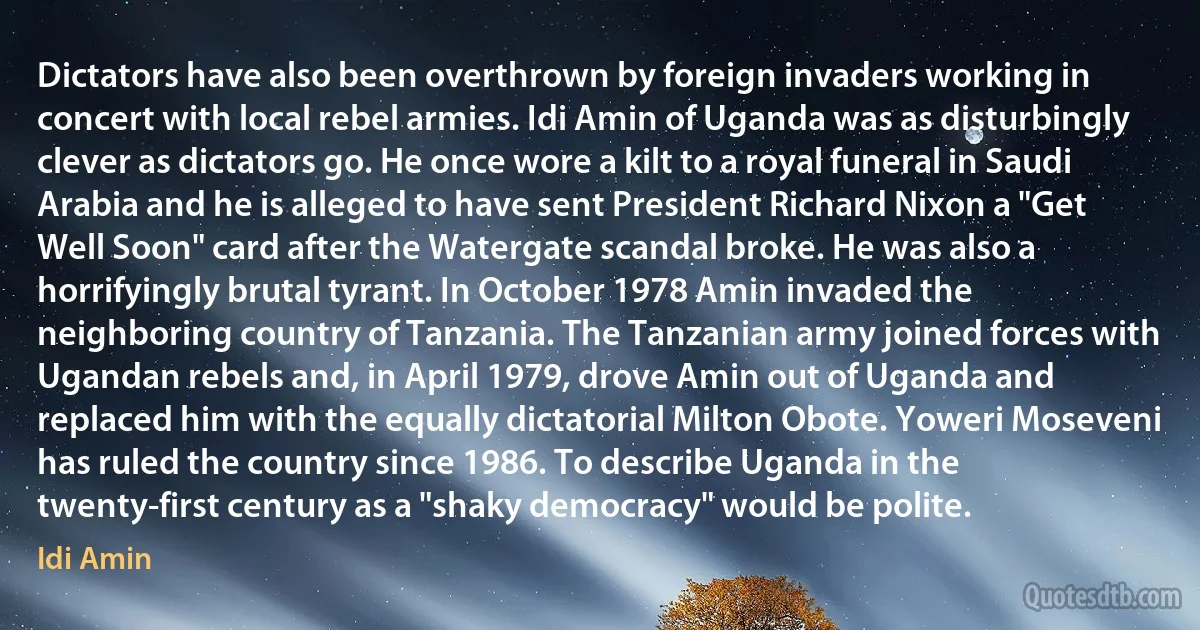
Dictators have also been overthrown by foreign invaders working in concert with local rebel armies. Idi Amin of Uganda was as disturbingly clever as dictators go. He once wore a kilt to a royal funeral in Saudi Arabia and he is alleged to have sent President Richard Nixon a "Get Well Soon" card after the Watergate scandal broke. He was also a horrifyingly brutal tyrant. In October 1978 Amin invaded the neighboring country of Tanzania. The Tanzanian army joined forces with Ugandan rebels and, in April 1979, drove Amin out of Uganda and replaced him with the equally dictatorial Milton Obote. Yoweri Moseveni has ruled the country since 1986. To describe Uganda in the twenty-first century as a "shaky democracy" would be polite.
Idi AminRelated topics
april army broke century country foreign funeral kilt october once president sent wear well working twenty-first Milton Saudi Arabia Nixon amin watergateRelated quotes
Venezuelans! An army of brothers, sent by the Supreme Congress of New Granada, has come to liberate you, and is now amongst you after having expelled the oppressors from the provinces of Mérida and Trujillo. We have been sent to destroy the Spaniards, to protect Americans and to re-establish the republican governments which made up the Venezuelan Confederation. The states which we have liberated are once again ruled by their old constitutions and leaders, and they fully enjoy their liberty and independence. Our sole mission is to break the chains of servitude which still oppress some of our peoples. We have no intention of passing laws or exercising power, even though the laws of war might authorize us to do so.

Simón Bolívar
The sudden swelling of the rivers, and the absence of the King with his army, gave Venkutputty leisure to muster the whole of his forces, which amounted to one hundred thousand men. The leaders were Yeltumraj, Goolrung Setty, and Munoopraj, who marched to recover Gundicota from the hands of Sunjur Khan. Here the enemy were daily opposed by sallies from the garrison, but they perservered in the siege; when they heard that Moortuza Khan, with the main army of the Mahomedans, had pentrated as far as the city of Krupa, the most famous city of that country, wherein was a large temple. This edifice the Mahomedans destroyed as far as practicable, broke the idol, and sacked the city...

Firishta
Mahmud was a man of great abilities, and is renowned as one of the greatest champions of Islam.... His influence upon Islam soon became widely known, for he converted as many as a thousand idol-temples into mosques, subdued the cities of Hindustan, and vanquished the Rais of that country. He captured Jaipal, who was the greatest of them, kept him at Yazd (?), in Khurasan, and gave orders so that he was bought for eighty dirams. He led his armies to Nahrwala and Gujarat, carried off the idol (manat) from Somnat, and broke it into four parts. One part he deposited in the Jami Masjid of Ghazni, one he placed at the entrance of the royal palace, the third he sent to Mecca, and the fourth to Medina.

Mahmud of Ghazni
There is, let me assure you, nothing in nature more egocentrical than the embattled democracy. It soon becomes the victim of its own war propaganda. It then tends to attach to its own cause an absolute value which distorts everything else. Its enemy becomes the embodiment of all evil. Its own side, on the other hand, is the center of all virtue. The contest comes to be viewed as having a final, apocalyptic quality. If we lose, all is lost; life will no longer be worth living; there will be nothing to be salvaged. If we win, then everything will be possible; all our problems will become soluble; the one great source of evil--our enemy--will have been crushed; the forces of good will then sweep forward unimpeded; all worthy aspirations will be satisfied.

George F. Kennan
Yasuji Okamura, commander of the Japanese forces in China, had this to say about the Chinese Nationalist Army: "The center of resistance was neither the four hundred million Chinese civilians, nor the two million-strong ragtag army composed of local troops. Instead, it was the Central Army, led by the young officers of the Whampoa Military Academy, with Chiang Kai-shek at its nucleus. In numerous major battles, the Central Army not only was the main force engaged in combat, but also oversaw the local troops who were increasingly losing the will to fight. The Central Army kept the local troops from wavering. As seen, training by Whampoa was thorough, and it was impossible to resolve the China Incident peacefully with the existence of such an army.

Yasuji Okamura
